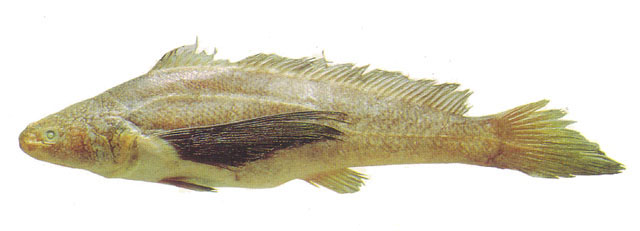| Sciaenidae (Drums or croakers) |
| 32 cm TL (male/unsexed) |
|
demersal; brackish; marine; depth range - 25 m |
| Western Atlantic: Colombia (Ref. 5217) to Brazil. |
|
Dorsal spines (total): 11-11; Dorsal soft rays (total): 32-34; Anal spines: 2-2; Anal soft rays: 7-7. Colour dark greyish above, yellowish to pale below. Pectoral fins long and jet black. Tips of pelvic and anal fins dark. Inside of gill cover black. Eye small, about 8 to 9 times in head length. Mouth small, inferior, enclosed under snout. Chin with 5 pores and many barbels, 3 to 4 pairs in a tuft around median mental pore, 15 or 16 pairs along median edges of lower jaws and subopercles. Pectoral fins greatly enlarged, extending beyond anal-fin base. Gas bladder narrow, about equal to head length, bearing anteriorly 2 pairs of appendages, anterior pair short and horn-like, lateral pair long, tube-like, extends to posterior end of gas bladder (Ref 51721). |
| Found over mud or mud-sand bottoms of estuaries and adjacent areas (Ref. 5217). Feeds on bottom-dwelling organisms, mainly worms. Marketed fresh and salted. |
|
Data deficient (DD); Date assessed: 09 October 2019 Ref. (130435)
|
| harmless |
Source and more info: www.fishbase.org. For personal, classroom, and other internal use only. Not for publication.
